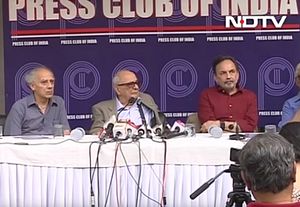In the two weeks since India’s Central Bureau of Investigation (CBI) launched a raid on the offices and the homes of NDTV staff in India, an important conversation regarding government interference in the media has resurfaced. The atmosphere surrounding the issue remains murky and longstanding suspicions of the strong nexus between the investigation agency and the ruling Bharatiya Janata Party have once more been brought to the fore.
On June 5, the CBI conducted its raid, prompting a statement from NDTV declaring that it was based on unproven complaints from a disgruntled former employee. The complaint, on the basis of a loan default, was further dismissed as baseless by the organization, which furnished the proof of repayment along with its statement.
Furthermore, the implication that this raid was based on a year-old complaint that was private in nature sparked concerns that it was politically motivated. Days prior to the raid, as several members of the Indian media have been quick to point out, the ruling Bharatiya Janata Party’s spokesperson Sambhit Patra was asked to leave an NDTV debate for his accusations against the channel in the face of criticism.
Minister of State for Information and Broadcasting Rajyavardhan Rathore responded to this by saying that while the government was committed to protecting freedom of expression, it was also responsible for preserving the law of the land. While voices within the media have indicated that there may well be a case for this raid and that it was premature to cast this as retaliation for government criticism, several prominent members have a different opinion.
The Editors’ Guild of India has since issued a statement implicating this move as a violation of the principle of the freedom of the press within a democracy, pegging it as a possible attempt to silence the media. The Press Club of India subsequently organized a meeting to protest the raid. The CBI, in turn, responded with the argument that NDTV was not singled out in this raid process. Explaining that this raid was not about loan default as much as a larger list of violations of banking sector guidelines, the organization placed this investigation along the spectrum of a long list of others on the issue of banking fraud.
However, the absence of a preliminary inquiry ahead of this raid has not silenced the criticism. The Press Club meeting for instance was the site of incensed conversation. Prominent media figures like Kuldip Nayyar and Arun Shourie even discussed parallels between the current government’s attitude towards the media and the time of Emergency under former Prime Minister Indira Gandhi. The ensuing discussion expressed worry at the majoritarian tendencies of the government, a need to move beyond institutional affiliations in the interest of preserving shrinking spaces for dissent, and the absence of protocol in the investigation.
The space for dialogue regarding the actions of the army in Kashmir, the anti-beef agenda, moral policing — to name just a few issues — has been fast shrinking amid perceptions that the government will seek to retaliate. Comparisons to the Emergency, while perhaps hyperbolic, are nevertheless worrisome as they are indicative of the beginnings of a trend towards heightened censorship in India. The defensiveness of the ruling party in the face of criticism has been on the rise in the past few years, and the NDTV has faced unexpected consequences for the second time in a year, following its 24-hour blackout in November 2016.
The recent raids, in keeping with this trend, inspire a feeling of unease and worry regarding what they might foretell.

































